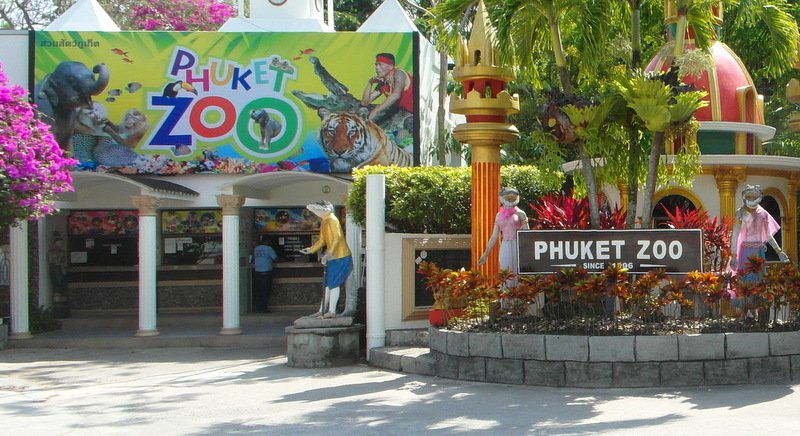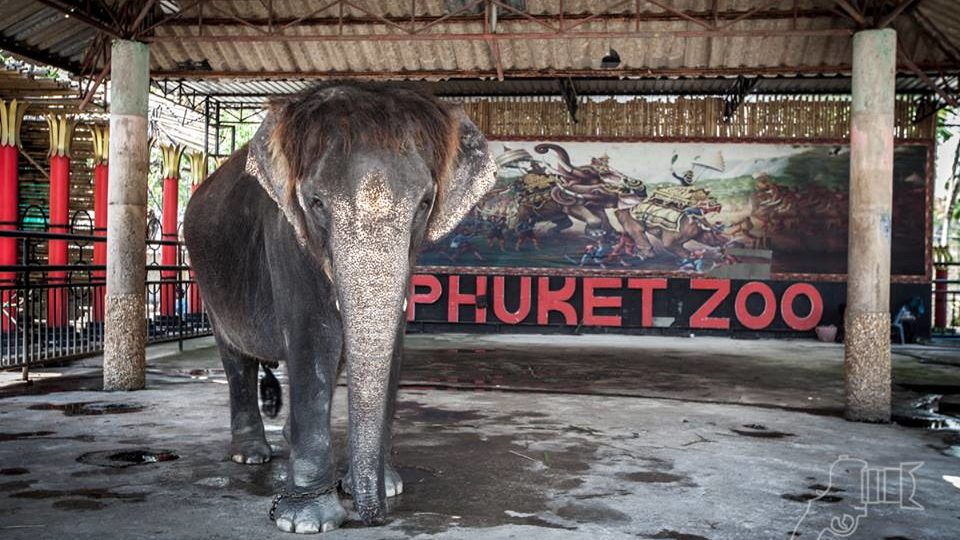Island officials confirmed that Phuket Zoo is under instructions to improve conditions for animals — most notably for the apes and monkeys — housed there.
The news follows award-winning Brit photographer Aaron Gekoski, 37, reporting on horror conditions at Safari World and Pata Zoo in Bangkok, as well as Phuket Zoo, through a report posted in several news outlets.
The report noted despairing conditions for animals and blasted Safari World in Bangkok for forcing orangutans to perform shows to entertain tourists, including having the apes perform a fake boxing match with female orangutans wearing skimpy bikinis and posing as “ring girls.”
Piyawat Sukon, Chief of the Khao Phra Thaew Non-Hunting Area Thaew Conservation Center in Thalang, confirmed yesterday that Phuket Zoo is already under orders to improve conditions for apes and monkeys kept there – if it wants to keep its license as a public zoo.

The Khao Phra Thaew Non-Hunting Area Office is the Department of National Parks, Wildlife and Plant Conservation (DNP) office responsible for the welfare of wildlife animals in Phuket and neighboring provinces.
Piyawat pointed out that Phuket Zoo was instructed to improve conditions for animals during an inspection about three months ago by a committee of the Zoological Park Organization (ZPO), which is the ultimate authority in Thailand for issuing permits for venues to operate as public zoos.
Without the ZPO’s consent, zoo licences are not approved.
“I joined an inspection of Phuket Zoo conducted by a ZPO committee about three months ago. I saw that some parts of Phuket Zoo were kept very well, such as the elephant section, and were approved,” Piyawat said.
“But other areas, such as the sections where apes and monkeys are kept, were not good and needed to improved.”
Piyawat explained that the inspection was “special” in that it was conducted in response to Phuket Zoo applying to renew its license to operate as a public zoo.
If the ape and monkey areas are not improved, the ZPO will be unlikely to renew Phuket Zoo’s license, he said.
Meanwhile, Paisal Sukhapunnapun, of the Phuket Fisheries Office, has confirmed that a crocodile pictured trapped in a tiny enclosure in the report is not “Leypang,” the mixed-breed crocodile captured on Phuket’s west coast in August of last year.
Paisal was tasked with ensuring the care of “Leypang” and making sure that the croc’s new home is appropriate. After much debate, Leypang was handed over to Phuket Zoo to keep in good health.
“I can confirm that the crocodile in the photo is not Leypang. The enclosure at Phuket Zoo created especially for Leypang is much bigger than this,” Paisal said.
“Last month, I went to check on Leypang. I can confirm that Leypang is healthy and eating well,” Paisal said.
“Leypang is very much in the people’s interest, so Phuket Zoo can’t ignore making sure the shelter is appropriate,” he noted.
‘I will return to check in on Leypang from time to time to make sure he is being kept well, though right now I cannot confirm the exact date of my next visit,” Paisal said.
Pichai Sakunsorn, of Phuket Zoo Co. Ltd., declined to comment in detail on the conditions animals at the zoo are kept in.
Instead, he insisted that Phuket Zoo is “in the process of improving conditions” for animals kept there. Pichai declined to provide any photos of the animals’ housing conditions at the zoo today.
“I don’t like this news, which affects Thailand, and especially Phuket as a tourism attraction, with Phuket Zoo being the focus,” Pichai said.
“Whatever we do always results in negative feedback for us. Phuket Zoo is not supported by the government. We have to run it by ourselves and provide our own budget to fix and run the zoo. It needs time,” he said.
“I don’t want to go into this in more detail. Just talking about this topic is enough for today,” he added.
Phuket Zoo last made international headlines in the despairing case of “Milo the Orangutan,” dangerously overweight through poor diet and lack of exercise and kept in a cage under a stage at the zoo, being dumped into the wild in central Phuket amid fears that Milo had been illegally obtained.
Although finally taken into protective care after being held at Phuket Zoo for two years, Milo died just weeks later.
Whether or not Milo was legally acquired was never made clear. However, officials were proud to announce that two other baby orangutans discovered at Phuket Zoo during an inspection resulting from the Milo fiasco were legally acquired – from Safari World in Bangkok.
Story: The Phuket News
Related:
Photojournalist brings attention to shocking cruelty in Thailand’s animal attractions (PHOTOS)
Shows, selfies, and shaming: Experts weigh in on elephant tourism in Thailand




